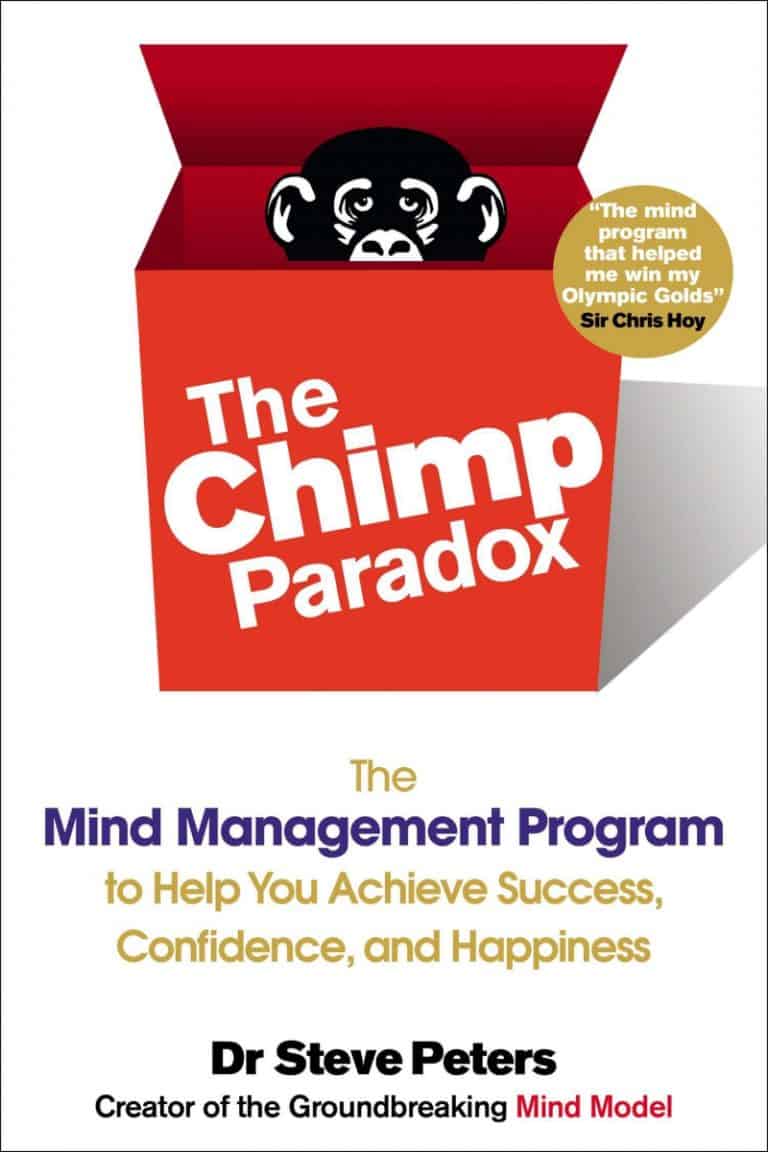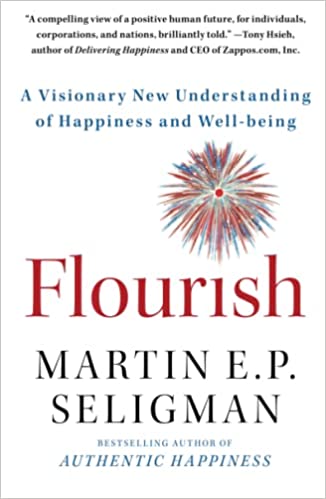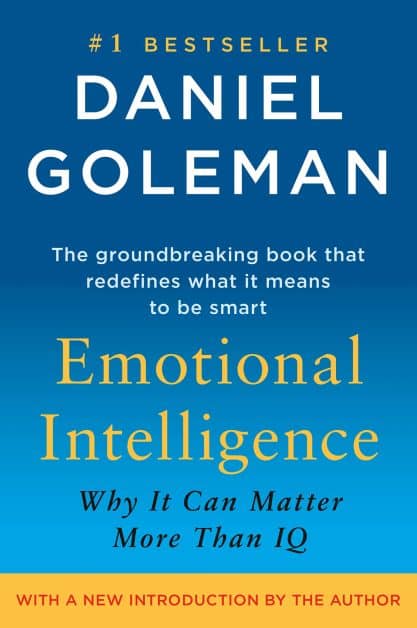Our site features affiliate links. If you buy through them, we earn a commission at no extra cost to you. Thanks for your support!
Emotional management, the emotion quotient, emotional intelligence. Three fancy ways of saying the same thing – how we manage the thoughts and feelings that enter our mind.
No one teaches us this stuff, yet is perhaps the most influential knowledge we can obtain. How can we push ourselves to achieve great wealth, health, and success when we can’t even manage our internal thoughts?
Fortunately, this article summarizes the best three books available to help you understand your thoughts and feelings, only after which we can then learn to manage them. Don’t fall into the trap most low-quality books preach, however, that you can fully control and master your emotions.
We cannot control them any more than we can control how we flinch at a loud bang (we will see why later). But we can learn to manage them, but only after we first understand them.
The Chimp Paradox – Steve Peters

The Chimp Paradox by English psychiatrist Steve Peters outlines what I consider one of the most powerful concepts in understanding, and therefore managing, our primal urges. Fear, hatred, jealousy, and rage are all inherent human instincts that, in today’s day and age, are often more of a hindrance.
Steve Peters surmises that all human thoughts and behaviors stem from one of two possible sources, each creating different results; the “Human” and the “Chimp”. The Human part of the brain is rational and proactive; it is there to help you thrive. The Chimp, on the other hand, is primal and reactive; it is there to help you survive.
The Chimp is emotional and reacts far quicker than the human part of the brain. In situations where the brain senses a potential for harm, such as someone cutting you off in traffic or someone sending you a snide email, the chimp, not knowing any better, instantaneously reacts to this input by thinking you are in physical danger and reacts in the only way it knows how; by activating the fight or flight response.
Once the threat has passed, and the chimp has had time to calm down, guilt and regret usually follow once the human part of the brain has had a chance to analyze the situation rationally. We know we shouldn’t have reacted to that road rage incident or replied to an email so angrily. Even when you are in the right, arguing with people rarely helps either party.
This Chimp has evolved to help avoid danger when we were once hunter-gatherers. In our modern society, however, the Chimp often overreacts and often causes us to act in a way we most likely wouldn’t have had we thought more rationally.
The Chimp Paradox outlines some excellent techniques to avoid succumbing to the faults of the Chimp, and instead learn to use the more productive human side of our brain. Learning to recognize when your Chimp is starting to dominate your thoughts is one of the most powerful and immediate ways to avoid overreacting in the first place.
Some events, however, are just too emotional to simply wish away. Remember, the Chimp is extremely dominant and therefore quick to take over your thoughts. Steve Peters, therefore, suggests distracting the Chimp.
For example, if you’re worried about financial matters, go for a nice walk where the scenery can distract you, or if you are worried about family matters, go on a night out with your friends.
As a student, I relied on exercise and sports to clear my mind; it is extremely difficult to worry about completing an essay on time when your heart rate is over 180 bpm. Your Chimp now has more pressing priorities.
For extreme cases, even distracting the Chimp won’t work. For the most stressful events, Peters suggests using a technique called “boxing” the chimp. To do this, first allow the chimp to say what it needs to say for as long as it needs to. Let it vent.
Like how anger can be released by swinging at a punching bag for a few minutes until fatigued, the Chimp can be exhausted mentally but allowing it to vent by bringing these emotions to the surface.
In your mind, release all those feelings brewing up inside, don’t hold back, and don’t be ashamed. After you have vented, and the chimp has fatigued, it won’t be able to fight against the logical human side of the brain any longer and you can now control it with reason. Metaphorically, you have now exhausted the chimp enough to be able to box it and close the lid.
Peters ends with the enlightening statement that “you are not your feelings”. If you tend to lash out in emotion, it is not necessarily a problem with your fundamental character. Overreacting does not make you a bad person, it just means you are unable to manage your emotions (aka your chimp).
You do not have to act on your feelings; they are separate from your actions. You may feel road rage when someone cuts you off, and that’s ok. In fact, it is perfectly normal; your chimp is trying to protect you in the only way it knows how. No one is going to judge you for your thoughts. But you can choose how you act. To do this you need to practice managing your chimp.
Check out The Chimp Paradox on Amazon here
Flourish – Martin Seligman

This book is an absolute hidden gem, and possibly my favorite book of all time. It is written by leading American Psychologist Dr. Martin Seligman and is packed with his decades of ground-breaking scientific study.
Note that this is not an easy book to read – it contains rigorous scientific data that feels aimed at other specialists in the field. But taken slowly, while appreciating his technical style of writing, there is more information packed in these few hundred pages that in any other book.
Few books tackle the question of how to be happy. There are countless books on how to be rich, how to dominate the property market, and how to attain lasting wealth, but not how to simply be happy.
No longer is this the case. Seligman hits it out of the park with logic and science.
The main information in Seligman’s latest attempt to define happiness is in the PERMA model. This focuses on the concept of “well-being”, a new type of psychology called “Positive Psychology” which aims to take people beyond the traditional approach of simply getting better but to a limitless potential of positivity and success.
PERMA is an acronym for the five components of well-being:
1) Positive Emotion
Any simple feelings of pleasure you get from your favorite activities, such as the love felt from a hug or the joy from playing a video game. The emotion is usually short-lived, however, and lasts only as long as the activity itself.
2) Engagement
This is measured by how much we enjoy doing whatever we are doing. It is measured by a concept called flow, the feeling of loving something you are doing so much that you lose all sense of time and feel as if you are “in the zone”.
3) Relationships
Humans are social creatures by nature, so it should be no surprise that relationships form a significant component of our well-being. The whole is usually greater than the sum of its parts, so looking for a ‘team’ of enjoyable people, such as friends and family, makes us stronger as individuals.
4) Meaning
There has to be a purpose to whatever we do in order for it to be worth doing. Many people make the mistake of wishing to be rich, only to find out that money alone is not fulfilling. Meaning comes from whatever is important to you, such as building the world’s best product, building a strong company, or taking care of your aging parents. There is no right or wrong meaning, and it varies greatly from person to person. But finding it is important if you are to boost your well-being.
5) Accomplishment
We are all human, and a sense of accomplishment is what rewards our subconscious mind and makes it all worth doing. Without a reward and a sense of accomplishment, we would not be able to motivate ourselves to accomplish great things, because we would not be able to convince our emotional minds that the hardships endured will be worth it.
All five components are needed to attain a sense of well-being – if any one of these is missing you will never feel fulfilled or be allowed to flourish.
Check out Flourish on Amazon here.
Emotional Intelligence – Daniel Goleman

Schools and universities focus on academic knowledge, useful for getting us jobs and preparing us for a career, but not for being happy. Education doesn’t tackle the intangible yet vitally important aspect of emotional intelligence or the knowledge of how to manage your thoughts and feelings.
Daniel Goleman seeks to change this in his legendary book Emotional Intelligence. He explains the importance of emotions, why we have them, why they are necessary, and also why they sometimes cause us to do some irrational things. He also offers practical advice on how to improve our emotional intelligence and how it leads to a successful life.
Goleman explains an old topic but in a fresh way – that we have two separate minds, the rational and the emotional, that act in different ways and have different purposes. Understanding this is key to realizing why we think and act the way we do, even if it sometimes seems illogical.
One great lesson from the book is that there are two parts to being emotionally intelligent.
The first is to be emotionally self-aware. We regularly preach the power of mindfulness here on Modern Mind Masters and Goleman here summarises it as the ability to recognize and label your feelings. To be able to change, we first need to know exactly what needs to be changed.
The second part is emotional self-regulation. We cannot control emotions from the subconscious part of the brain (they are primal impulses that occur faster than the conscious mind can react), but we can, and must, learn to manage them.
For example, when you are at peace and hear a sudden, loud bang, your emotional mind will perceive it as a threat and put your body in alert mode, most likely by making you “jump”. But when your slower but rational brain catches up and sees that there’s no actual threat, it calms you down again, so you can get back on with what you were doing.
This highlights the two minds perfectly – you cannot control your subconscious emotional mind any more than you can control yourself flinching at a large sudden bang. Only the rational mind can calm you down but it is slower and always acts after the event.
The book also refers to the positive correlation between EQ (emotion quotient i.e. emotional intelligence) and future success and health.
For example, students with higher levels of empathy seem to get better grades, even if their peers are just as intelligent. That’s because they can better manage their feelings (such as persevering when facing a challenging question) and perform better in social settings, like knowing when to speak and when to be quiet in class.
Where EQ differs from IQ is that it can be actively improved through knowledge and experience, whereas science shows that IQ is very difficult to meaningfully improve.
Goleman suggests two ways of improving our EQ; mirroring other people’s body language and taking accountability for our failures.
This book provides a comprehensive guide to a little spoken-about subject. But the rewards are immense in all aspects of life, and more importantly, you will find a new way to manage negative emotions.
Check out Emotional Intelligence on Amazon here.
Honorable Mentions
Still hungry for more information? Try these honorable mentions:
1) How emotions are made: The secret life of the brain – Lisa Feldman Barrett.
A book not afraid to challenge the traditional views of emotions as fixed and universal, Barrett argues in her bestseller that emotions are not hardwired, but rather constructed by the brain based on sensory input, such as what we see, hear, and sense. The book explores the brain’s role in generating emotions and emphasizes the flexibility and subjectivity of emotional experiences.
2) Behave: The biology of Humans at our best and worst – Robert M. Sapolsky.
This monster read delves into the complex interplay between biology, psychology, and social factors that influence human behavior. By looking at genes, brain structures, and environmental factors, Sapolsky sheds light on the intricate natures of the good, bad, and the ugly of human behavior.
3) The Elephant in the brain: Hidden motives in everyday life – Robin Hanson
This book does not hold any punches by arguing that humans often have hidden, self-serving motives their actions. By understanding these motives, we can begin to piece together why humans tend to behave the way they do.
Conclusion
Never mind the best three books on emotional management, these may be the best three self-improvement books of all time. They always rest at the front of my bookshelf and I refer back to them more times than a pastor refers to his bible. Perhaps this is no surprise, as together, they represent the bible of a happy life.
Leave a Comment to let me know your thoughts!
Other book reviews you might enjoy:
3 Must-Read Motivational Books







2 Responses
The “Chimp Paradox” changed so much how I perceive myself, how I manage my crazy impulses, and how I deal with my wild thoughts.
“Flourish” helped me to understand that happiness is actually a combination of things that lead to well-being, and it is achievable by acknowledging P.E.R.M.A. and working on those aspects of our lives for a fulfilled and healthy life.
Thanks for this great article. I’ll check the other books I haven’t read yet.
I’m glad you enjoyed those two books as much as I did!